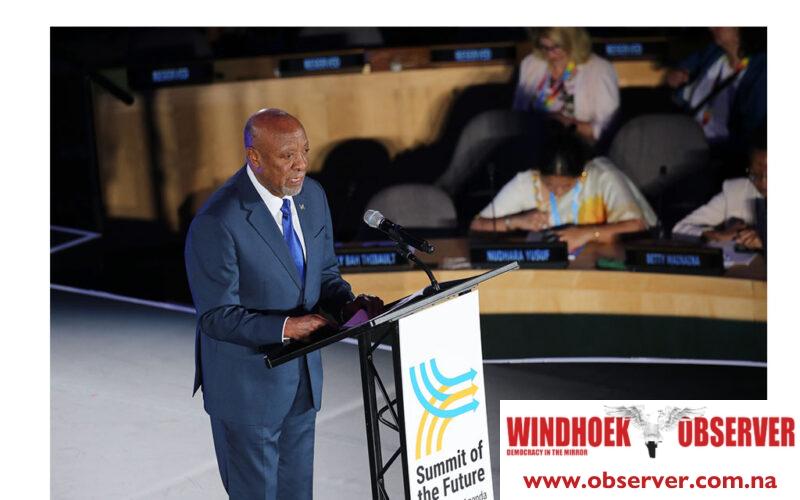Niël Terblanché
During the closing session of the Summit of the Future in New York on Saturday, President Nangolo Mbumba urged world leaders and civil society to collaborate more effectively to address global challenges.
Leaders and representatives from across the globe viewed the summit as a “once-in-a-generation opportunity” to reshape international cooperation, rethink multilateralism, and chart a path for a more sustainable, just, and peaceful future.
Before attending the summit, Mbumba held a courtesy meeting with Philémon Yang, the President of the United Nations General Assembly, where they discussed issues impacting humanity, from ongoing global conflicts to the need for collective development efforts.
Mbumba emphasised the need to resolve global conflicts so that nations can concentrate on development instead of devoting resources to protracted disputes.
Mbumba highlighted the vital role of civil society and youth in shaping the future, particularly in addressing pressing global issues like climate change, technological inequality, and peacebuilding.
He stressed the importance of adopting the “Pact for the Future”—a landmark agreement expected to serve as a foundation for addressing future challenges such as climate crises, digital inequality, and human rights.
The Summit of the Future, which took place at the United Nations Headquarters, is a response to increasing global instability due to crises like the COVID-19 pandemic and climate emergencies.
The summit’s primary objective was to reform outdated global systems and strengthen multilateral efforts to tackle challenges such as climate change, sustainable development, and peacebuilding.
Mbumba reiterated the core message of the summit, stressing that humanity’s future depends on cooperation and shared responsibility.
He pointed to Namibia’s experience as an African nation particularly vulnerable to climate change, with farmers suffering from severe droughts and coastal communities at risk due to rising sea levels.
“Peace is not just the absence of war. It is the presence of justice, equality, and human rights,” Mbumba told the assembled participants.
Mbumba also stressed the transformative potential of technology, urging world leaders to ensure that technological advancements do not widen the gap between rich and poor nations.
He called for global action to address inequalities in digital access and ensure that the benefits of new technologies reach marginalised populations.
Namibia’s historical partnerships and engagements in global peace and security initiatives demonstrate the nation’s commitment to multilateralism, which underpins its involvement at the Summit of the Future.
Namibia has long been an advocate for international cooperation, particularly during its liberation struggle, and continues to play a role in global efforts for sustainable development.
As the summit came to a close, world leaders were encouraged to look ahead and implement the recommendations and commitments outlined in the Pact for the Future.
“The focus will now shift to translating these commitments into action, with the hope of creating a more equitable and sustainable world for future generations,” Mbumba said.
According to Mbumba, the Summit of the Future stands as a key moment for reforming global governance and ensuring that the international community is equipped to address both present and emerging global challenges.




